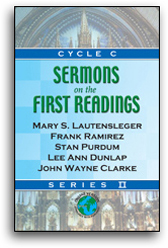SermonStudio
The Hard Task Of Truth-telling
Sermon
Sermons on the First Readings
Series II, Cycle C
Carrie's1 high school guidance counselor noticed she had been acting out a bit in school recently. She had appeared depressed and had been having some authority issues over rules and such. The guidance counselor set Carrie up with a local pastor who had been volunteering a few hours each Friday after a teen suicide a few months before. Most of the other students who came to see the pastor just needed someone to listen to their usual teen issues and heartaches. But, shortly into their time together, Carrie began to open up about some real grown-up problems.


